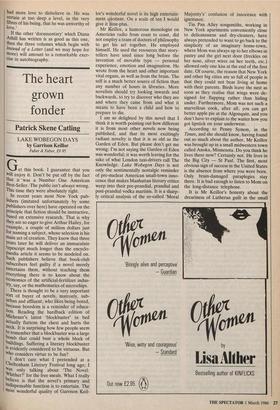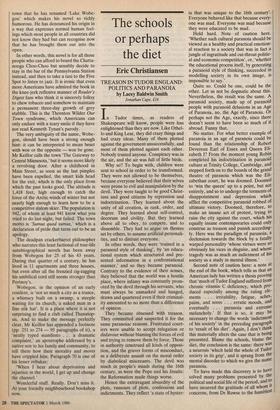The heart grown fonder
Patrick Skene Catling LAKE WOBEGON DAYS by Garrison Keillor
Faber & Faber, £9.95
Get this book. I guarantee that you will enjoy it. Don't be put off by the fact that it was a Number One American nest-Seller. The public isn't always wrong. This time they were absolutely right.
In recent years most New York pub- lishers (imitated unfortunately by some Publishers over here) have operated on the Principle that fiction should be instructive, based on extensive research. That is why they are so eager to give Arthur Hailey, for example, a couple of million dollars just for naming a subject, whose selection is his main act of creation. They know that three Years later he will deliver an immaculate typescript much longer than the encyclo- paedia article it seems to be modeled on. Such publishers believe that book-club subscribers feel guilty if a novel merely entertains them, without teaching them everything there is to know about the economics of the artificial-fertilizer indus- try, say, or the mathematics of microchips.
There is thought to be a very important sort of buyer of novels, matronly, sub- urban and affluent, who likes being bored, because boredom is a reminder of educa- tion. Reading the hardback edition of Michener's latest 'blockbuster' in bed actually flattens the chest and hurts the neck. It is surprising how few people seem to remember that a blockbuster was a large bomb that could bust a whole block of buildings. Suffering a literary blockbuster is evidently considered to be virtuous. But Who considers virtue to be fun?
I don't care what I pretended at a Cheltenham Literary Festival long ago; I Was only talking about 'The Novel: Whither?' for the free meals. What I really believe is that the novel's primary and indispensable function is to entertain. The most wonderful quality of Garrison Keil- lor's wonderful novel is its high entertain- ment quotient. On a scale of ten I would give it fine-plus.
Mr Keillor, a humorous monologist on American radio from coast to coast, did not employ a team of doctors of philosophy to get his act together. He employed himself. He used the resources that story- tellers have used since long before the invention of movable type — personal experience, emotion and imagination. He wrote from the heart and other important vital organs, as well as from the brain. The self is a much better source of fiction than any number of hours in libraries. More novelists should try looking inwards and backwards, to try to discover who they are and where they came from and what it means to have been a child and how to prepare to die.
I am so delighted by this novel that I think it is worth pointing out how different it is from most other novels now being published, and that its most excitingly radiant novelty is that it is as old as the Garden of Eden. But please don't get me wrong: I'm not saying the Garden of Eden was wonderful; it was worth leaving for the sake of what London taxi-drivers call The Knowledge. Lake Wobegon Days is not only the sentimentally nostalgic reminder of pre-nuclear American small-town inno- cence that makes Manhattan literary critics weep into their pre-prandial, prandial and post-prandial vodka martinis. It is a sharp- ly critical analysis of the so-called 'Moral Majority's' confusion of innocence with ignorance.
Tin Pan Alley songsmiths, working in New York apartments conveniently close to delicatessens and dry-cleaners, have always pretended to want to go back to the simplicity of an imaginary home-town, where Mom was always up to her elbows in pastry and the girl next door (freckles on her nose, silver wires on her teeth, etc.) allowed only one kiss at the end of the first date. Of course, the reason that New York and other big cities are so full of people is that they could not bear living at home with their parents. Birds leave the nest as soon as they realise that wings were de- signed for flapping rather than hiding under. Furthermore, Mom was not such a marvellous cook, after all; you can get better apple pie at the Algonquin, and you don't have to explain to the waiter how you got lipstick on your underwear.
According to Penny Symon, in the Times, and she should know, having found out so much about the author, Mr Keillor was brought up in a small midwestern town called Anoka, Minnesota. Do you think he lives there now? Certainly not. He lives in the Big City — St Paul. The first, most obvious sign of success in the United States is the absence from where you were born. Only brain-damaged paraplegics stay there. It is bad enough to listen to Mom on the long-distance telephone.
It is Mr Keillor's honesty about the' dreariness of Lutheran guilt in the small town that he has renamed 'Lake Wobe- gon' which makes his novel so richly humorous. He has denounced his origin in a way that expresses normal human feel- ings which most people in all countries did not know they had but can recognise now that he has brought them out into the open.
In other words, this novel is for all those people who can afford to board the Chatta- nooga Choo-Choo but sensibly decide to stay in the bar of the Pennsylvania Station instead, and then to take a taxi to the Five Spot to listen to jazz. It is ironic that even more Americans have admired the book in the knee-jerk reflexive manner of Reader's Digest fans who think it is sincerely folksy to chew tobacco and somehow to maintain a permanent three-day growth of grey stubble. This is the Thornton Wilder Our Town syndrome, which Americans can only endure with a teary smile if they have not read Kenneth Tynan's parody.
The very ambiguity of the name, Wobe- gon, should have been a strong enough hint: it can be interpreted to mean beset with woe or the opposite — woe be gone. Mr Keillor calls the town 'The Gateway to Central Minnesota,' but it seems more likely a revolving door. After a childhood in Main Street, as soon as the last pimples have been expelled, the smart kids head for the exit, which is the only place from which the past looks good. The altitude is 1,418 feet, high enough to catch the force of the Arctic winds of winter but not nearly high enough to learn how to be a competitive slalom skier. The population is 942, of whom at least 941 know what you tried to do last night, but failed. The town motto is 'Sumus quod sumus,' which is a declaration of pride that turns out to be an apology.
The deadpan crackerbarrel philosopher who narrates this least factional of true-life autobiographical novels has been away from Wobegon for 25 of his 43 years. During that quarter of a century, he has lived in 11 apartments and three houses, but even after all the frenzied zig-zagging his umbilical cord still seems stronger than Portnoy's.
Wobegon, in the opinion of an early resident, is 'not so much a city as a trance, a whimsey built on a swamp, a steeple waiting for its church, a naked man in a fine silk hat'. It is a place where it is not surprising to find a club called Thanatop- sis. And to make the message perfectly clear, Mr Keillor has appended a footnote (pp. 251 to 274 — 95 paragraphs of it), a 'neatly typed manifesto . . . a dramatic complaint,' an apostrophe addressed by a native son to his family and community, to tell them how their morality and mores have crippled him. Paragraph 70 is one of his lesser rebukes: 'When I hear about deprivation and injustice in the world, I get up and change the channel.'
Wonderful stuff. Really. Don't miss it. At your friendly neighbourhood bookshop now.















































 Previous page
Previous page